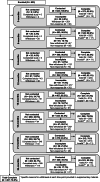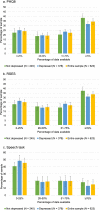Remote Assessment of Disease and Relapse in Major Depressive Disorder (RADAR-MDD): recruitment, retention, and data availability in a longitudinal remote measurement study
- PMID: 35189842
- PMCID: PMC8860359
- DOI: 10.1186/s12888-022-03753-1
Remote Assessment of Disease and Relapse in Major Depressive Disorder (RADAR-MDD): recruitment, retention, and data availability in a longitudinal remote measurement study
Abstract
Background: Major Depressive Disorder (MDD) is prevalent, often chronic, and requires ongoing monitoring of symptoms to track response to treatment and identify early indicators of relapse. Remote Measurement Technologies (RMT) provide an opportunity to transform the measurement and management of MDD, via data collected from inbuilt smartphone sensors and wearable devices alongside app-based questionnaires and tasks. A key question for the field is the extent to which participants can adhere to research protocols and the completeness of data collected. We aimed to describe drop out and data completeness in a naturalistic multimodal longitudinal RMT study, in people with a history of recurrent MDD. We further aimed to determine whether those experiencing a depressive relapse at baseline contributed less complete data.
Methods: Remote Assessment of Disease and Relapse - Major Depressive Disorder (RADAR-MDD) is a multi-centre, prospective observational cohort study conducted as part of the Remote Assessment of Disease and Relapse - Central Nervous System (RADAR-CNS) program. People with a history of MDD were provided with a wrist-worn wearable device, and smartphone apps designed to: a) collect data from smartphone sensors; and b) deliver questionnaires, speech tasks, and cognitive assessments. Participants were followed-up for a minimum of 11 months and maximum of 24 months.
Results: Individuals with a history of MDD (n = 623) were enrolled in the study,. We report 80% completion rates for primary outcome assessments across all follow-up timepoints. 79.8% of people participated for the maximum amount of time available and 20.2% withdrew prematurely. We found no evidence of an association between the severity of depression symptoms at baseline and the availability of data. In total, 110 participants had > 50% data available across all data types.
Conclusions: RADAR-MDD is the largest multimodal RMT study in the field of mental health. Here, we have shown that collecting RMT data from a clinical population is feasible. We found comparable levels of data availability in active and passive forms of data collection, demonstrating that both are feasible in this patient group.
Keywords: Cohort study; Longitudinal; Major depressive disorder; Multicentre; Remote measurement technologies.
© 2022. The Author(s).
Conflict of interest statement
JCB and PA are full-time employees of H. Lundbeck A/S. DCM has accepted honoraria and consulting fees from Apple, Inc., Otsuka Pharmaceuticals, Pear Therapeutics, and the One Mind Foundation, royalties from Oxford Press, and has an ownership interest in Adaptive Health, Inc. NVM is an employee of Janssen Pharmaceutica NV and may hold company equity.
QL, NM, SV and VN are employees of Janssen Research & Development, LLC and hold company stocks/stock options. JMH has received economic compensation for participating in advisory boards or giving educational lectures from Eli Lilly & Co, Sanofi, Lundbeck, and Otsuka. No other authors have competing interests to declare.
Figures





References
-
- James SL, Abate D, Abate KH, Abay SM, Abbafati C, Abbasi N, et al. Global, regional, and national incidence, prevalence, and years lived with disability for 354 diseases and injuries for 195 countries and territories, 1990-2017: a systematic analysis for the global burden of diseases study 2017. Lancet. 2018;392:1789–1858. doi: 10.1016/S0140-6736(18)32279-7. - DOI - PMC - PubMed
-
- Beratis S, Katrivanou A, Georgiou S, Monastirli A, Pasmatzi E, Gourzis P, et al. Major depression and risk of depressive symptomatology associated with short-term and low-dose interferon- α treatment. J Psychosom Res. 2005. 10.1016/j.jpsychores.2004.03.010. - PubMed
-
- Cambridge OR, Knight MJ, Mills N, Baune BT. The clinical relationship between cognitive impairment and psychosocial functioning in major depressive disorder: a systematic review. Psychiatry Res. 2018. 10.1016/j.psychres.2018.08.033. - PubMed
Publication types
MeSH terms
LinkOut - more resources
Full Text Sources

